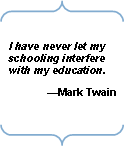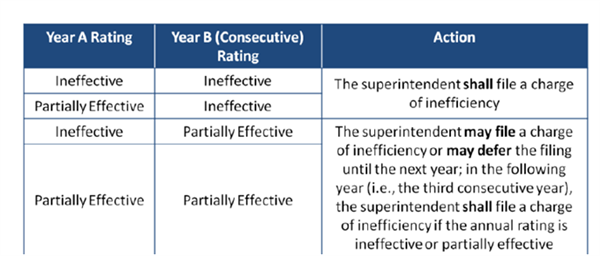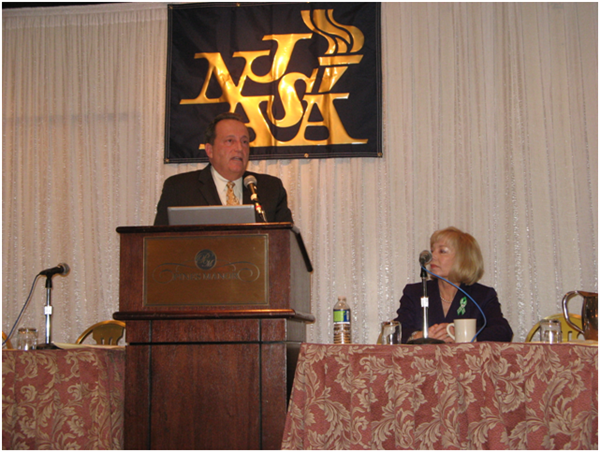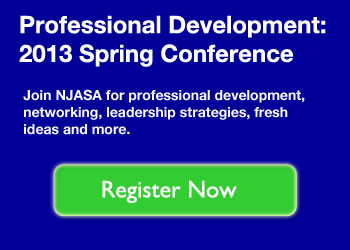- NJASA
- 2013
-
Get the Scoop On NJASA’s 2014 Education Technology Conference and Expo Techspo
Posted by Dr. Richard G. Bozza on 12/13/2013On January 30th and 31st, 2014 NJASA is hosting the 19th annual Techspo Conference at Bally’s Atlantic City. The conference is a technology training and exhibition for key school leaders and administrators in New Jersey. Over fifty workshops and exhibitions will showcase the latest tools, technology and top resources in education, plus there will be two days of opportunities to meet and network with colleagues, exchange ideas, and discuss pressing education issues.

 Techspo keynote speakers include Alan November, a director of an alternative high school, computer coordinator, technology consultant, and university lecturer, and Mark Prensky, international speaker, writer, consultant, innovator and visionary in education and learning.
Techspo keynote speakers include Alan November, a director of an alternative high school, computer coordinator, technology consultant, and university lecturer, and Mark Prensky, international speaker, writer, consultant, innovator and visionary in education and learning. Alan November is known for helping schools, governments and industry leaders improve the quality of education through technology on multiple continents. His areas of expertise include planning across curriculum, staff development, new school design, community building, technology, and leadership development.
Classroom Computer Learning Magazine named Alan one of the nation’s fifteen most influential “thinkers of the decade.” Alan’s writing includes numerous articles and best-selling books, including his most recent book “Who Owns the Learning?”. Alan was co-founder of the Stanford Institute for Educational Leadership Through Technology and is most proud of being selected as one of the original five national Christa McAuliffe Educators.
You can follow Alan on Twitter, here.
 Marc Prensky, coiner of the terms “Digital Natives” and “Digital Immigrants”, is considered one of the world’s leading experts on the connection between learning and technology. Marc’s professional focus is on understanding students and their future needs and designing better pedagogy and curriculum for the digital generation. Prensky’s original ideas on how to adapt both our teaching methods and content to prepare young people in better ways for their future are being adopted around the world.
Marc Prensky, coiner of the terms “Digital Natives” and “Digital Immigrants”, is considered one of the world’s leading experts on the connection between learning and technology. Marc’s professional focus is on understanding students and their future needs and designing better pedagogy and curriculum for the digital generation. Prensky’s original ideas on how to adapt both our teaching methods and content to prepare young people in better ways for their future are being adopted around the world.Marc has published scores of essays and articles, and is the author of five books: Digital Game-Based Learning (McGraw-Hill, 2001), Don’t Bother Me Mom – I’m Learning (Paragon House, 2006), Teaching Digital Natives: Partnering for Real Learning (Corwin, 2010), From Digital Natives to Digital Wisdom (Corwin 2012) and BRAIN GAIN: Technology and the Quest for Digital Wisdom (Palgrave-Macmillan 2012).
Mark holds Master’s degrees from Yale University, Middlebury College and The Harvard Business School, ran a charter school in East Harlem, NY, and has taught at all levels, from elementary to college.
You can follow Marc Prensky on Twitter, here.
Below is some information on what attendees need to know about the conference.
CONFERENCE INFORMATION
· A one day pass at Techspo is valid for only Thursday, January 30, 2014 or Friday, January 31, 2014. $235.00
· A conference pass for two days is valid for both Thursday and Friday, and includes all food and beverages provided by Techspo. $385.00
· All Techspo conference registrations must be completed and submitted no later than January 17, 2014.
· The waiver request for overnight lodging was approved by the Commissioner of Education, allowing school districts to reimburse attendees for overnight lodging on Thursday, January 30, 2014.
· Late Registration or On-Site Registration will include a $50 charge that will be added to the registration fee.
· The official Techspo Conference Badge is your admittance to sessions and included food functions.
HOTEL INFORMATION
· Bally’s Atlantic City is the official hotel for Techspo 2014
· NJASA has negotiated a special rate of $99.00 for a single or double per night.
· The special rate will only be offered until the room block is filled up or January 7, 2014, whichever happens first.
· To take advantage of the special rate, simply call: Bally’s Reservations at (888) 516-2215 between the hours of 9:00am and 3:00am, provide the Group Code SBNJS4
· All applicable tourism, state and city taxes are in addition to the quoted rates. Parking is also additional.
· NJASA does have a cancellation policy. All registrations cancelled after 4:00 pm, Friday, January 17, 2014, will result in a charge of the specified registration fee.
EXHIBITOR INFORMATION
· Currently all exhibitor space is sold out. If you would like to be placed on a waiting list, please send an email to Charlotte Duthie at cduthie@njasa.net.
· All businesspersons must use the Vendor Exhibitor Registration Form to attend. Please call Charlotte Duthie at (609) 599-2900, ext. 127 to obtain a form.
· You must be an allied member in order to exhibit at Techspo.
For more information on NJASA professional development opportunities please visit the Professional Development section of our website.
-
A Guide to Professional Development for New Jersey School Leaders
Posted by Dr. Richard G. Bozza on 11/26/2013It’s been a long time since I’ve earned my doctorate. But it hasn’t been long since I’ve sat in a classroom taking notes and asking questions. Professional development is as essential to my job as any other responsibility.
As New Jersey school leaders, we’re charged by the state to develop an annual professional development plan that derives from the results of our annual evaluation and identifies professional goals aligned to individual, school, and/or district goals. I say there’s another reason for professional development. Professional development offers the support we need to reach, and even exceed, our goals. We are charged with developing high performing districts that are globally competitive in an increasingly demanding economy and diverse culture. That’s no small task.
The New Jersey Association of School Administrators offers a professional development series geared toward increasing your effectiveness as a school leader. All presentations are designed to satisfy state mandates and you can earn professional development credit for attending any of our professional development programs. Visit www.njasa.net to learn more.
We offer a variety of sessions from morning or afternoon programs to conferences that last several days.
Here are just some of our programs.
- One-day seminars hone in on particular topics from school security to technology to curriculum. We delve into the topic with expert presentations from 9 a.m. to 1 p.m.—and we get you back on the job that same afternoon. Topics we’ve covered have included social media, bring your own device initiatives, using data to drive instruction, and contract administration.
- Our New Superintendents’ Academy is specially geared toward your first and second years on the job—or those “new” to New Jersey. We help you get oriented to the relationships, practices and priorities are that are critical to achievement of your goals. Sessions focus on topics from leadership to personnel management and legal issues.
- Our Novice Superintendents’ Academy is for second or third year superintendents as well as those new to New Jersey. These sessions give you a chance to expand upon the skills gained in your first year. For example, you might learn the pitfalls to avoid in school board relations or the importance of the evaluation process.
- The NJASA Women’s Caucus works to encourage and support women leaders in education. The Caucus also promotes gender, race and ethnic equality in educational systems.
- The NJASA School Leadership Summit was held in conjunction with our fall workshop. We brought New Jersey into the national conversation on key issues affecting our schools.
- Finally, TECHSPO is a conference about educational technology held each winter in Atlantic City. This two-day event brings together experts in technology with school districts that are pioneering the next advances.
One-Day Seminar Series- One-to-One Technology and BYOD Initiatives: Best Practices and Policy, Friday, December 20, 2013
- The Role of the Superintendent in Achieve NJ: Compliance and Practice Affecting the Evaluation of Teachers and Leadership Team, January 17, 2014
- Contract Administration: Effects of New Tenure Law, FMLA, Seniority and Non-Renewals, February 28, 2014
- Legal Update: Recent Case Law Impacting HIB, Special Education and Other District Practices, March 18, 2014
- Social Media? The Good, the Bad, and E-Learning: Instruction – Communication – Marketing – Legal Pitfalls, April 8, 2014
- Building Your District’s Leadership Capacity: Managers to Instructional Leaders, May 6, 2014
New Superintendents’ Academy- What Does the New Superintendent Need to Know About School Business Operations? Asking the Right Questions, December 19, 2013
- Personnel Management: Understanding the Process, Procedure, and Potential Issues, January 22, 201
- The Complexity and Challenges of Special Education: Through the Lens of the Superintendent, February 20, 2014
- Strategic Planning Drives the Use of Financial Resources: Assigning Entitlement and Discretionary Resources to Meet Your Goal(s), April 30, 2014
Novice Superintendents’ Academy- School Board Relations, January 23, 2014
- Pitfalls to Avoid
- How to Handle a Strong Board
- Executive Session Guidelines
- Personnel, March 11, 2014
- Hiring and Firing After the First Year
- Importance of the Evaluation Process
- Impact of New Tenure Laws
TECHSPO 2014TECHSPO, scheduled for January 30-31, 2014, is full two-day, unique state-of-the-art conference designed specifically for K-12 educators and their communities. It will provide group sessions and action labs that will present data, knowledge and materials to complement the school curricula through the use of educational technology in the classroom environment.
-
Lessons New Jersey Educators Can Learn from the World’s Best Schools
Posted by Dr. Richard G. Bozza on 11/20/2013Recent global studies revealed what schools, parents and teachers in the highest scoring countries share in common. The results are not surprising. Curriculum, home and school environments, and achievement focused-common goals were the keys to success. Here’s what we can learn from these countries as we’re continuing to develop best practices for New Jersey’s schools. For a video summarizing these points, click here.
First some background: There were two studies that tracked student achievement in math, science and reading. The Trends in International Mathematics and Science Study (TIMSS) assessed fourth and eighth graders in 63 countries and 14 states or regions. The Progress in International Reading Literacy Study (PIRLS) assessed fourth graders in 49 countries and 9 states or regions.
The results showed that students from East Asian countries, and a select group of European countries, outperformed their peers. The researchers zeroed in on five education systems that had a high level of achievement across all subject areas: Singapore, Chinese Taipei, Finland, Hong Kong and Russia. Here’s what these school systems have in common.
Good reading skills drive high achievement in literacy and help analyze complex texts in math and science. Students enjoyed reading and were motivated to read. Not only did reading drive high scores in literacy, it helped students better understand the complex material that they read in math and science.
Teachers understood the curricular goals, communicated expectations to students, and presented content in interesting and relevant ways. Teachers used engaging instruction to bring together the student and the subject matter in a way that sparked interest and stimulated learning. High achieving students knew what their teacher expected, had a teacher that was easy to understand, and were interested in what the teacher said.
Achievement was a common goal at school and home. Administrators and teachers expected student achievement, parents supported it, and students wanted to excel. All parties were equally invested in student success. In addition, students liked mathematics, science and reading, and were confident in their skills in these areas.
Schools are safe places where discipline is maintained; bullying is infrequent; and students can focus on learning. There were ample resources in these schools, including space for learning, staff to instruct, and adequate materials. There were no problems with overcrowding or shortage of supplies. The schools were equipped for student success.
The home environment provided the foundation for high achievement early on.
Parents engaged children in early numeracy activities, for example counting rhymes, number games, shape puzzles, etc. Similarly, they engaged them in early literacy activities. Student homes were filled with books. Children were encouraged to read, tell stories, sing songs, and play word games at home. School age students had their own space for studying and access to an Internet connection.
Creating the school and home environments that foster high achievement is an ongoing goal in New Jersey. We hope this study underscores the steps that we can take to bring New Jersey’s districts to the next level.
-
Do Evaluation Reforms Contribute to 21st Century Learning?
Posted by Dr. Richard G. Bozza on 11/7/2013Most people with whom I speak envision the future of education differently from that of the past. The influence of technology in the learning environment and its potential to personalize learning are cited as “game changers” by many. Conversations by educators envision a learning environment increasingly at the control of the student with technology providing “just in time” delivery at the individual’s level of learning.
We are seeing a dramatic shift toward this use of technology-based instructional resources. Digital materials are making their way into
 classrooms to support instruction and as replacements for textbooks. Blended learning courses combining traditional and digital learning opportunities are expanding. We are seeing an explosion of online learning opportunities including archived video lessons such as Khan Academy and MOOC’s (Massive Open Online Courses) aimed at interactive participation and open access on the web. Student access to educational materials on their tablets and smart phones is growing, making knowledge available outside the brick and mortar schoolhouse and accessible when students want it.
classrooms to support instruction and as replacements for textbooks. Blended learning courses combining traditional and digital learning opportunities are expanding. We are seeing an explosion of online learning opportunities including archived video lessons such as Khan Academy and MOOC’s (Massive Open Online Courses) aimed at interactive participation and open access on the web. Student access to educational materials on their tablets and smart phones is growing, making knowledge available outside the brick and mortar schoolhouse and accessible when students want it. All these developments raise an interesting question about educator evaluation reforms. Are educator evaluation models which focus on traditional teaching and student outcomes on standardized assessments misaligned with the evolving role of teachers and 21st century learners? Perhaps a more appropriate question might be: “To what degree might the reliance on these indicators of teacher effectiveness be counterproductive?”
Ian Jukes, Director of the InfoSavvy Group and frequent NJASA TECHSPO keynote speaker, talks about educators needing to be an educational quarterback. What does he mean by that? The quarterback doesn’t throw the football to where the receiver is at the start of the play, but down the field where he anticipates the player will be. Educators need to “look down the technology field” and anticipate how the role and practice of educators will change in order to develop the resources and strategies for transforming, not reforming, our practice. If teacher effectiveness is judged on an increasingly outmoded model, and we track that performance to settle on compensation, determine job retention, and judge teacher preparation programs at the college level; are we impeding the progress that we need to ultimately make to prepare students for their future?
We shall be soliciting feedback from members about the implementation of NJ Achieve during the year to better learn about the resources and support needed by practitioners to ensure success for their students. We shall do that with an eye toward the shifting roles of educators as we develop recommendations for the evaluation of their future work.
NJASA is energetically examining schooling and educational resources for the future. Here are some of our initiatives:
· The Vision 2020 Committee is defining a vision for New Jersey public education and has recently surveyed members for input to that vision.
· NJASA has joined with K12 Aventa Learning to provide online learning opportunities for students (follow this link for the New Jersey Online Learning Services).
· NJASA is delivering and archiving free webinars focusing on the subject of online learning (follow this link for information and registration).
· NJASA is partnering with Kean University’s School for Global Education & Innovation and the New Jersey Association of Colleges for Teacher Education to offer a statewide MOOC conference on November 15 (follow this link for information and registration).
· NJASA will continue its leadership in technology and education with the sponsorship of TECHSPO 2014, the state’s biggest and best technology conference and exhibition (follow this link for TECHSPO information).
NJASA leaders, staff and volunteers work daily to ensure a superior statewide system of education and to maximize the capacity and effectiveness of school leaders through professional development programs and support services, both today and for tomorrow.
-
Budgets, Government Shutdown Among Topics at NJASA Women’s Leadership Initiative
Posted by Dr. Richard Bozza on 10/22/2013The government shutdown may be over—for now—but Congress still has to come to terms with federal school funding. Find out what’s happening in Washington on this issue and others that will impact your district at the NJASA Women’s Leadership Initiative. It’s scheduled for Wednesday, October 23, at the NJSBA/NJASA/NJASBO Fall Workshop in Atlantic City, N.J., and it’s one of the many valuable sessions that will help you become a better educational leader.

The NJASA Women’s Leadership Initiative, in particular, was designed to help women in, or aspiring to, positions in educational leadership. With networking, support and professional development, we want to create a clear pathway for women to engage, encourage, and inspire one another.
Noelle M. Ellerson, associate executive director, Policy & Advocacy, for the AASA is the featured speaker. Noelle is presenting from 1 p.m. to 2:30 p.m. that Wednesday in room 404 of the Atlantic City Convention Center. If you were able to reserve before the deadline, you’ll be treated to a thought-provoking conversation about what is happening in Washington and how it impacts New Jersey’s schools. For example:
- It’s time to reauthorize the Elementary and Secondary Education Act (“No Child Left Behind”). This is a federally flawed policy that could improve school districts in all 50 states if it is updated. (Hint: It’s also not the only piece of education legislation that’s past due or ready for reauthorization.) It’s time for Congress to act!
- The government shutdown is over. But the budget discussion has just begun. The House budget keeps education budget funding at the 2004 level, despite the fact that we have 6 million more students to educate. The Senate budget has some cuts but is the one preferred by AASA. A bipartisan conference is critical to resolving this soon.
- There are proposed changes to E-Rate, the program that helps schools afford Internet technology. Changes will expand broadband access, which is good. But we want to make sure that the government understands that it comes with a price cost that schools cannot cover. (The good news: Because E-Rate is not funded through federal appropriations, it was not subject to sequestration or impacted by sequestration. Additional funds would be collected by USAC, and would not come in the form of increased taxes from the federal level. )
- Follow other trending issues via Noelle’s frequent blog posts at aasa.org/aasablog.aspx.
The Women in Leadership session required pre-registration but many of the other—equally relevant—sessions do not. There are more than 200 learning opportunities from large group sessions to more intimate Learning Labs and Action Labs. Here is a sampling of some trending topics. For a guide to navigating the event, click here.
Leadership
- The NJASA School Leadership Summit will bring the knowledge, experience and skills of public school superintendents into the national conversation about the future of public education more prominently.
Technology
- Ten of the Coolest Things You Can Do with a SMART Board
- Robots in Special Education Classrooms
- The Buzz on B.Y.O.D. (Bring Your Own Device)
Security
- Lock Down in Real Life – West Windsor-Plainsboro Case Study
- LobbyGuard – Solution to Help Keep Our Youth Safe at School
- Preparing Your Schools for Dangerous Intruders
Evaluation & Tenure
- Teacher Tenure Arbitration Outcomes
- Educator Evaluation: Where We’ve Been and Where We’re Going
- A Thoughtful Framework for Evaluating and Enhancing Teacher Effectiveness
Attendees will leave the conference as better leaders who can inspire and motivate others to give students a better education, and they will be better prepared to advance their personal career. There’s still time to register and you can even do so on-site. For more information, visit http://njsbaworkshop2013.sched.org. We hope to see you there!
-
What’s New in 2013-2014 New Jersey Education: Teacher Evaluations, Math and Language Arts, and Trash Talk
Posted by Dr. Richard G. Bozza on 8/5/2013What’s new in New Jersey’s schools? There’s plenty on the agenda, from student test scores and teacher evaluations, to changes in math and language arts curricula and anti-bullying restrictions on the sports field. New Jersey’s Chief Education Officers are preparing for implementation of the new teacher assessments and the new Common Core State Standards, and we’re watching developments of the recent take-down on ‘trash talking’ on the sports field. Here are the top items to watch for the 2013-14 school year.

New Teacher Evaluations
The proposed changes in teacher evaluation aren’t new. But there hasn’t been enough time to assess the results of the pilot phase. We advocate taking time to share those results, educate districts, train teachers, and determine how the new assessments are working with changes in technology and curriculum, so that we can provide a truly authentic assessment.
This fall, New Jersey’s teachers will be evaluated with a new system put into effect by a state law, the Teacher Effectiveness and Accountability for the Children of New Jersey (TEACHNJ) Act.- Student test scores count for nearly a third of Teacher Evaluations. The law requires districts to adopt new evaluations that include student test scores and more frequent observations, initially only for language arts and math teachers in grades 3 to 8. Student test scores will make up 30 percent of the teacher’s evaluation.
- New Jersey gets more time to implement Teacher Evaluation changes. In June, U.S. Education Secretary Arne Duncan gave states permission to postpone using test scores when making personnel decisions until 2016-17. That will give teachers a chance to get used to the new common core curriculum standards being rolled out this year, and a new generation of standardized tests coming in 2014-15. Unfortunately, New Jersey Commissioner Chris Cerf has refused to apply for the extension noting that state law requires implementation in the new school year, so it’s not an option for New Jersey schools.
- Legislators requested more time to review data. Assemblywoman Mila Jasey (D-Essex) and Assemblyman Patrick Diegnan Jr. (D-Middlesex) sponsored a resolution to postpone the implementation of the new evaluation system for one year, citing that districts don’t yet have the data or lessons learned from those that piloted the system this past year.
- Teacher evaluation will affect teacher tenure. Under TEACHNJ, teachers are given a rating ranging from highly effective to ineffective. If a teacher receives a partially effective rating, or an ineffective one for two years, they may be subject to tenure proceedings and can ultimately lose their tenure.

Source: http://www.state.nj.us/education/genfo/faq/faq_eval.shtml
New Principal EvaluationsIt’s difficult enough to implement a new teacher evaluation program. Implementing a new principal evaluation program at the same time will stretch school resources, and could negatively impact results. We urge the state to take some time to evaluate the results of the teacher program, and ensure that it is authentic assessment, before mandating the new principal evaluation program.”
School leaders can anticipate changes in principal evaluations, also as a result of TEACHNJ. Principals, vice principals, and assistant principals will be measured by a combination of student achievement (50 percent) and principal practice (50 percent). Any individual who is rated Ineffective or Partially Effective will receive additional support through a Corrective Action Plan (CAP). To maintain tenure, principals will have to earn the rating of Effective or Highly Effective.
As with teacher evaluation, an extension is available to states. Commissioner Chris Cerf has refused to apply for the extension, so it’s not an option for New Jersey schools.New Curriculum and Testing
New curriculum and testing requires a significant investment in technology, which may not be budgeted. The nature of the tests also is still evolving, and has to be evaluated. These are among the issues that must be resolved before the new curriculum and testing can be fully implemented. NJASA is helping to smooth the process for new curriculum and testing. We held a special program sponsored by Intel to inform superintendents about the new requirements. The NJASA Technology Committee is identifying implementation issues.
Schools are gearing up for heavily revised math and language arts curriculum standards, part of the launch of the Common Core State Standards, adopted by 45 states and the District of Columbia. Standards are being implemented and will be assessed for the first time in 2014-15.
- The new standards will require more frequent and comprehensive testing, including computer-directed performance-based tasks. The Partnership for Assessment of Readiness for College and Careers (PARCC) is piloting online testing for state math and language arts exams. That means schools will have to get up to speed in terms of technology, software, and high-speed connections.
- While the full launch isn’t scheduled for 2014, districts have already gotten started. Education reporter John Mooney provides a good summary of where schools are currently, and what changes to expect.

New Anti-Bullying Rules For Sports
One of the most difficult questions posed by districts is how to address all types of incidents that occur online and off school grounds, including nights and weekends. We need to be able to draw the line so that districts are clear, with funding available for these additional responsibilities.
New Jersey recently received national attention when the state’s interscholastic athletic association clamped down on ‘trash talking’ on the sports field.
- ‘Trash talking’ is bullying. The New Jersey State Interscholastic Athletic Association (NJSIAA) announced the new rules, “that interscholastic athletic events are free from harassing conduct related to race, gender, ethnicity, disability, sexual orientation or religion.” The full statement may be found at http://www.njsiaa.org/NJSIAA/SportsmanshipStandardsPR2013.pdf.
-
Summer Learning and Fun Can Boost Core Curriculum Skills; 10 Tips for Enrichment from New Jersey’s Chief Education Officers
Posted by Dr. Richard G. Bozza on 6/24/2013 School’s out for the summer. Now kids—and parents—can relax for a couple of months, right?
School’s out for the summer. Now kids—and parents—can relax for a couple of months, right? In theory, that’s the case. But the reality is that learning is a skill, and like any skill, it can be lost if not reinforced continually. Summer is a great time for parents, schools and the communities to offer students a chance to bridge a learning gap, get ahead, maintain skills and explore new ideas and areas they want to learn more about.
According to the Johns Hopkins University Center for Summer Learning1, “all students experience learning losses when they do not engage in educational activities during the summer.” Not only that but “on average, students lose approximately 2.6 months of grade level equivalency in mathematical computation skills during the summer months.”
This opportunity to continue learning in a non-school environment doesn’t mean you must invest in an expensive program. Here’s what many of my colleagues have recommended to parents in their districts. Choose the activities that fit best for your child and your budget and you will both be satisfied.
10 Tips for Summer Learning
Tip #1: Read, read, and read. Your child might already have required summer reading for school. Help them read books that are of interest to them, and for the avid reader, encourage some ‘just for fun’ reading. Your local library is a great resource.
Tip #2: Reinforce math in daily life. We use math all the time, whether we realize it or not. The summer is a great time to get your child involved. Bring him along on shopping trips and have him calculate savings or count money. Reinforce percentages by helping your child calculate the tip at restaurants. Teach fractions while baking. Or encourage your child to set up a lemonade stand. Some searching on the Internet will provide some other ideas. Education World is a good place to start.
Tip #3: Use technology to teach. Technology is everywhere, and chances are you’re not going to eliminate it this summer. But you can embrace the kinds of technology that promote learning. We suggest limiting TV and video games, but encouraging safe, parent-approved educational websites. Ask your school for suggestions; classes may be out but the administrative staff is there year-round. This is a great way to reinforce concepts learned and preview concepts for next year.
Tip #4: Stock up on puzzle books, word searches, brain teasers, etc. Keep some puzzle books in the car for long rides, and others at home to fill moments of boredom.
Tip #5: Take learning on the road. There’s nothing better than an experience to expand your child’s horizons. And it doesn’t have to be an expensive or a long vacation. Plan day trips to your local park, museum, zoo or other venue. Have your child find the site on www.mapquest.com, determine the route and estimate how much the excursion will cost. Encourage your child to take photos and put together a scrapbook of interesting facts about the trip.
Tip #6: Do a community service project. The summer is a great time to teach your child how to give back to the community. Help your child research the opportunities in your town. United Way is a clearinghouse for many local community needs. Choose a meaningful project that the whole family can do.
Tip #7: Plan at least one hour of physical activity a day. It’s not all academic. Incorporate some physical activity into your child’s summer, at least one hour a day. This may include swimming, biking, walking or a more formal community sports program. Physical activity has positive effects on academic achievement, including increased concentration and reduced disruptive behavior.
Tip #8: Enroll your child in a summer program. There are summer programs in every price range. This is a great opportunity for your child to explore a special interest, from drama to sports to art and more.
Tip #9: Consider a tutor for academic support. If your child has a learning gap, summer is the ideal time to catch up. Unfortunately, summer school has been cut from many districts’ budgets. But there are a variety of sources for tutoring services. These include current and retired teachers, National Honor Society high school students, and some community centers.
Tip #10: Allow for some unstructured time. “Down time” is ideal for encouraging creative thinking. This can include playtime with friends or by oneself, and gives kids a chance to fill their time in ways they enjoy.
Summer enrichment is so important to the success of our students that, at NJASA, we advocate for community support for low-cost educational programs. One source is the National Summer Learning Association, an organization that serves as a network hub for thousands of summer learning program providers. The Boys & Girls Clubs of America also provide much-needed programming in underserved areas. We encourage you to support programs like these that make a real difference in the lives of today’s students and tomorrow’s future leaders.
For more resources on engaging students in learning, contact your local school district. For information on joining NJASA, call (609) 599-2900 or visit our membership page.
1 http://www.today.com/id/13388817/ns/today-parenting_and_family/t/prevent-summer-learning-loss-your-kids/#.Ub9dqZUwwRk
-
Will Reforms Get Done Well or Just Get Done?
Posted by Dr. Richard G. Bozza on 5/6/2013Improved achievement for all students – a goal that every New Jersey educator supports and works toward as each strives to improve his or her practice. New initiatives outline a great deal to be accomplished by school personnel continuing into the next school year.
For many months, discussion among New Jersey school district leaders has focused on the resources needed not only to accomplish local district goals, but to address the increasing challenges created by both federal and state government mandates. Chief Education Officers, their staffs and school boards wrestle with the question of how to obtain needed resources, both human and capital, to implement overarching changes to educator evaluation; revise curricula and teaching practices to address the Common Core State Standards; identify and provide the bandwidth and devices for the digital assessments required of new PARCC assessments; and ensure that school environments and staff actions achieve the goals of New Jersey’s Anti-Bullying Bill of Rights.
It is clear to those directing the educational, operational and support services for students in local districts that these many changes are advancing quickly without the needed time and support to ensure their success. What is the response of state officials to the questions of capacity? Let’s take a look:
· The State Funding Reform Act (SFRA) Remains Underfunded
SFRA was developed after detailed study, cost analysis and determination of the fiscal support needed to provide the state mandate of a “thorough and efficient education.” All districts and taxpayers are affected by the underfunding. There is no current year or proposed FY 2014 funding for programs required to address harassment, intimidation and bullying.
· Funding based on Average Daily Attendance Reduces District Aid
A proposal to use average daily attendance rather than student enrollment will reduce state aid if average attendance is less than 96%. Basic materials such as textbooks, supplies, equipment and transportation required for students aren’t based on their attendance, but on their enrollment in the district. State aid shouldn’t shortchange districts, particularly those that have the most challenges in promoting student attendance. This proposal is not a component of the state education funding law.
· No Funding Provided for New Educator Evaluation Programs
All New Jersey school districts are required to implement new evaluation protocols this coming school year. The regulations introduced by the State Board of Education and the Governor’s budget proposal don’t recognize that additional resources are needed to train staff, set performance goals and measurements based on student outcomes, observe professionals more frequently in their work and conduct additional conferences to discuss student and staff progress. Even more importantly, there is no recognition of the needed resources to support the collaboration among educators in Professional Learning Communities to achieve the desired outcomes of the reforms bringing higher learning standards, new assessments and more rigorous performance appraisals.
· Administrative Budget Caps Impose Unnecessary Restrictions
Imposing a 2% cap on the increase of property taxes to support school districts provides sufficient control of education spending. School district leaders should be free to determine where to allocate approved funding, making the caps placed on administrative spending unnecessary, even counter-productive to providing the personnel necessary to accomplish the mandates of AchieveNJ.
· Election Change Implemented, but Not Timeline Adjustments
The great majority of school districts have moved school elections to November and eliminated budget votes by adhering to the 2% cap on the increase in property taxes used to support education spending. The enabling legislation left the job half done, however, as districts needed to mobilize budgets, public hearings and adoptions in short order after receiving state aid figures as though they were preparing for April elections. School officials’ time is valuable resource that could be used more prudently under revised guidelines.
· Debt Service Assessment Means Districts Have Less Aid
The Office of Legislative Services reports that 270 districts, or 48 percent, will realize net losses under the proposed FY 2014 budget ranging from a few hundred dollars to more than $200,000 since bills to districts for debt service on school construction grants are increasing. These fees were added as charges to districts and not included in their initial funding agreements or construction budgets.
Personnel of the State Department of Education find themselves stretched to the limit as well as they take on the leadership and oversight of the many reforms that affect all districts. In addition, the ramped-up work with schools demonstrating very low student performance and great discrepancies in achievement between student subgroups through the Regional Achievement Centers represents a significant dedication of Department resources. The recent announcement of state takeover of the Camden School District can only create significant additional demand on colleagues working within the DOE.
I had the privilege in April to attend the National Summit on Educator Effectiveness with NJ DOE colleagues. I believe that we all were struck by a presentation focusing on successful and unsuccessful implementation of evidence-based policies. Research demonstrates that even effective policies and interventions will fail if there are not effective implementation methods. As Robert Burns put it; “The best-laid schemes o' mice an 'men Gang aft agley.”
How do New Jersey educators avoid failed outcomes as we collectively march toward realization of the many initiatives that are before us? We need to first confront the reality of the lack of implementation resources and recognize that implementation strategies and field experience are in their seminal stages, not complete or tried and true. We must help government and political leaders understand that the resources of financial and human support, time, practice, feedback and collaboration among educators are critical if we are to achieve the outcomes that we all desire for our students.
NJASA leaders are engaged in this important conversation with legislators and senior officials at the NJ DOE. It is imperative that each of you joins with us in speaking about these issues in your communities with staff, parents, local leaders and state legislators. The will of education reformers may be strong, but the backs of practitioners bear the weight of transforming our schools to ensure that every New Jersey student is truly ready for a career or post-secondary education following graduation. Let’s work together to accomplish this important goal!
-
10 Reasons to Attend the 31st Annual NJASA/NJAPSA Spring Conference for Professional Development
Posted by Dr. Richard G. Bozza on 4/25/2013We’re getting ready to greet several hundred guests at the 31st Annual NJASA/NJAPSA Spring Conference at Caesars® Atlantic City on May 20-22, 2013. They’re coming for professional development, networking, fresh ideas, and inspiration. The conference covers:· The latest educational developments in technology
· School security
· Curriculum
· Management strategies
· And more
Attendees will leave the conference as better leaders who can inspire and motivate others to give students a better education, and they will be better prepared to advance their personal career. There’s still time to register; the deadline is May 10th without a late charge. We hope you will join us.
Here is our top 10 list of reasons to put the Spring Conference on your professional development calendar for 2013.
1. Learn how your district can ramp up security at “Getting a Handle on District Security—Preparedness, Prevention/Mitigation, Response and Recovery.” This program will cover partnerships in school safety that enhance security both on a day-to-day basis and long-term.
2. Get ready for PARCC (Partnership for Assessment of Readiness for College and Careers) in sessions including “Designing Classrooms to Prepare Students for PARCC” and “Preparing for PARCC – New Jersey Next Generation Standardized Assessment System.” Learn how to create classrooms that are problem-based, differentiated, student-centered and technology-infused.

3. Correct your misconceptions about school legal requirements for special education. Learn about special education legal requirements from keynote speaker Dr. Perry Zirkel. Dr. Zirkel is a Lehigh University professor who holds a Master of Law from Yale and is author of more than 1,200 pieces on school law.4. Hear from one of the country’s most outspoken critics of grades and test scores. Keynote speaker Alfie Kohn, a parenting and human behavior expert, will talk about rescuing education from test-driven results and one-size-fits-all-standards. 5. Learn how to easily incorporate technology in your schools. Wednesday, May 22, is TechDay. Sessions include “What Do Students Need From A Digital Textbook?” “Innovative, No-Cost Ways to Meet New Jersey’s Financial Literacy Standard,” and “Teacher Driven Professional Development Through Social Media and Web 2.0 Tools.”
5. Learn how to easily incorporate technology in your schools. Wednesday, May 22, is TechDay. Sessions include “What Do Students Need From A Digital Textbook?” “Innovative, No-Cost Ways to Meet New Jersey’s Financial Literacy Standard,” and “Teacher Driven Professional Development Through Social Media and Web 2.0 Tools.”
6. Discover the unintended consequences of digital education. Keynote speaker Hall Davidson of Discovery Education will present “Deep Unexpected Consequences: Knowledge and Leadership in the Age of Digital Education.”7. Get guidance on assessments. Sessions include “EE4NJ and the Principal Evaluation,” “Giving Teachers the Tools to Thrive in the Era of EE4NJ,” and “Update on the TEACHNJ Act: The First Year.”8. Network with fellow professionals. Use this opportunity to establish and grow relationships with your peers. From networking lunches to the President’s Reception, there is ample opportunity to meet new members and renew old friendships.
9. Browse the latest tools and resources. The Exhibit Hall offers both new and time-tested products and services to help your district work more effectively.
10. Get reimbursed for overnight lodging (if you qualify). The Commissioner of Education approved a waiver for overnight lodging, allowing districts to reimburse attendees approved to attend the conference.
We hope to see you there. Register today at https://www.njasa.net/domain/111 or call 609-599-2900. Make professional development a priority. And take your district to the next level.
-
NJASA Security Forum Offers 5 Recommendations for School Safety
Posted by Dr. Richard Bozza on 4/3/2013 Nearly three months after the tragic shooting at Sandy Hook Elementary School in Newtown, Conn., Superintendent Dr. Janet Robinson joined experts in education, homeland security, law enforcement, architecture and mental health and addressed more than 200 New Jersey chief education officers, school leaders and law enforcement personnel at the New Jersey Association of School Administrators (NJASA) School Security Conference in Edison. The conference examined strategies on how to improve security in New Jersey’s schools without compromising education.
Nearly three months after the tragic shooting at Sandy Hook Elementary School in Newtown, Conn., Superintendent Dr. Janet Robinson joined experts in education, homeland security, law enforcement, architecture and mental health and addressed more than 200 New Jersey chief education officers, school leaders and law enforcement personnel at the New Jersey Association of School Administrators (NJASA) School Security Conference in Edison. The conference examined strategies on how to improve security in New Jersey’s schools without compromising education.Dr. Robinson cautioned districts against turning their schools into fortresses. Schools should avoid giving a message to students that they’re only safe if there are armed guards around them. Because schools are safe places. And if we build a fortress around our children, it will be far more difficult for them to have the freedom to learn. We have to strike the delicate balance that keeps our children safe and allows them to explore and grow.
Here are the recommendations that came out of the 2013 School Security Conference:
· Every school district should have a security committee. This committee includes school officials, stakeholders from parents and teachers and other community members, and the local police and fire departments. Meet regularly to keep the topic of school security front and center.
· Strengthen communication. Examine protocols that already are established between schools and law enforcement officials, administrators and teachers, the school and parents, etc. Evaluate and update your systems for communicating in a crisis to ensure they are state-of-the-art. Make sure that you also have a back-up communication plan.
· Strengthen community mental health services. Work within your community to get low-cost and free resources to those who may need them.
· Limit access to assault weapons. Gun buyback programs are often very successful.
· Establish forums for sharing best practices. This way, districts will benefit from the most current thinking on school security.
Currently, New Jersey has a proactive school security task force, which has schools well- prepared for incidents of all kinds. New Jersey school districts currently have state-mandated checklists of 90 security tasks to be completed on a monthly basis, including active lock-down drills.
That doesn’t mean that we won’t continue to improve security in New Jersey’s schools. What happened in Newtown, Conn., has already prompted an even more proactive approach to school security. In Livingston, N.J., the district changed the intercom system to allow any staff member to announce a lock-down in case of emergency. Other districts have upgraded classroom doors with remote control locks. Elmwood Park Public Schools are considering adding a double door vestibule that can lock in a trespasser. The goal is to slow down the attack, if it cannot be prevented, to allow first responders time to arrive.
New ideas were explored at the conference. Bulletproof glass can cost $300 per square feet but security film that prevents glass from exploding is about $15 to $30 per square foot. One idea employs technology, from smart phones to iPads, to transmit information immediately to school officials and local law enforcement.
Schools are among the safest places our children can be. What is important is to keep the dialogue open on school security. Ultimately, it will be our children who will benefit.
For more information on school security and other issues affecting New Jersey’s schools, visit www.njasa.net.


